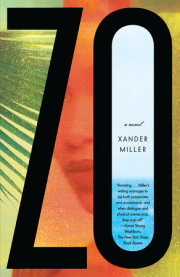Dried fish was Yiyi’s business. She walked the streets every day singing,
“Aransò! Aransèl!” That was all Zo knew about her. Sometimes he saw her haggling over the piles of anchovies in the morning. She was small and fierce, and her prominent underbite reminded Zo of the barracuda he saw sometimes swimming in the seagrass close to shore.
Pulling Zo aside one afternoon, she asked, “How would you like to live with me, at my house?”
Zo was thirteen years old and had figured no one would ever take him home. He didn’t think that Yiyi even knew who he was, and here she was about to adopt him. But he soon found out that it wasn’t exactly an adoption as much as it was a business proposition. Yiyi took him home, stood him in her kitchen, and explained the venture.
The plan was simple: she would make a fortune selling cold drinks. No one had electricity during the embargo, and a cold beverage couldn’t be had anywhere in the
arrondissement. She’d overheard important men saying they’d kill for an icy cola. But Yiyi knew where she could find a steady supply of ice. The brilliance of her idea—what set it apart from all the other ingenious little plans to sell cold drinks at that time—was that she would buy her ice from the government morgue. The only problem was the distance to the morgue. It was far, and the ice was heavy. The trail was bad and the hills were steep. She needed Zo to cart the ice.
He started his labors with a simple cooler, carrying it overhead from Grande Anse, filling it with ice at the morgue, and running it back again on the same trail. The people living along the route came to recognize him; they called out and cheered him on, especially in the bottom of the wide, misty valley where a pair of beautiful sisters sold cookies and biscuits.
Yiyi soon presented him with a wheelbarrow, which Zo loved inordinately. He washed it with soap and water, maintained the wheel bearings with castor oil, and patched the tire with rubber plugs when it was punctured by the hard gray rocks that studded the trail. Each morning, Zo would go to the morgue, put the block ice into Yiyi’s cooler, and then push it in the wheelbarrow back to her stall at the covered marketplace.
Yiyi refused to sell the ice, not even a chip for a toothache. “If you want cold, you better buy a drink,” she’d say.
Yiyi’s calculations had been correct: it proved to be a profitable business, but disastrous for her health. Selling ice-cold drinks exacerbated her ulcers. Salt fish lasted weeks in any weather, but the ice was always melting. On hot days she’d shout herself hoarse drumming up customers.
Yiyi suffered from indigestion, kidney stones, and gastric ulcers. She had a bad habit of scratching her back with the long kitchen knife she used as an ice pick. But she was capable of incredible generosity, especially after church services on Sunday, when Zo could expect to eat meat.
It was Yiyi who made him believe that a woman was a type of magic. Just by touching him she could cure his fear of the dark. Zo had no parents, and that touch was the one thing that eased his cold orphanhood. It was the only thing he ever wanted more of. For three years, he regarded Yiyi as his protector and her daughters as his closest companions.
Yiyi’s daughters called him
kabrit because he slept in the kitchen shed like a goat. They kissed him there one night while he sat up on his cardboard bedsheets, all three of them one after the other as if they were waiting in line to try. It was dark, and Zo tried to match their kisses to their temperaments. At twenty-one, Terez was the oldest and most mature. She went first and had the dry, perfunctory kiss of a matron. Next was Merline, the innocent middle daughter. Zo found that she had the dull, wet kiss of a simpleton. Only the youngest, fifteen-year-old Darlene, had any style. Her tongue did rare tricks in Zo’s mouth. But when he asked if she loved him Darlene laughed.
“Don’t be silly,
kabrit,” she said. “It’s only practice.”
The electricity had been restored by then and Yiyi couldn’t compete with the refrigerators of the professionals. She had gone back to selling dried fish, and needed Zo less and less. “He’s become handsome and lazy,” Yiyi told her friends. “A dangerous combination for a woman with three daughters.”
Taking Zo aside, she told him something he’d never forget.
“People will help you once,” she said. “But the next day you’ve got to fend for yourself.”
With that she arranged for him to be delivered by boat to her cousin in Jérémie.
Zo had seen the city once before, but only from the sea. He was amazed by the high balconies and the size of the highway trucks. When the Panamanian freighter
Dread Wilna made port, he sat and watched the stevedores unload cargo all night long.
Zo went to work for Yiyi’s cousin, who was a businesswoman just like Yiyi except she sold bread instead of salted fish. It was a subscription bakery business, and Zo took the loaves door-to-door in the morning with a wheeled cart that kept them hot. He was asked inside one morning by an older woman while they stood in her doorway, and he had gone just to see the inside of her house. She was a widow and there were many delicate things of porcelain and pictures of children older than he.
Zo made love to her there on the cool tile of the front hall in the late morning, with the city just beyond the door. He was seventeen and she thought of him like a young horse and coaxed him fittingly. “There now,” she said, “
dousman. Slowly.” She praised his chest and mentioned his power and said it came from there and from his stomach. She kept her skirt and panties on like hiding a secret even while she picked him naked.
Zo finished inside her because it was his first time and he knew no better. Afterward, she cradled his head on her breasts and called him sweet names, saying there was no danger any longer from that. She left him lying dazed and naked on the tiles at noon to fix a plate of white rice and
sos pwa, and then she fed him one spoonful at a time. She bought more loaves of bread than she could possibly eat and gave him more than they cost.
Zo was useless all afternoon. The bread went stale while he sat on the seawall regarding the twilit sea, haunted by the melancholy he’d picked up from the widow like a bad rash. He had tried to give her what she wanted, which was a forlorn love rooted in grief and smelling of her dead husband’s aftershave. He realized that to be a good lover was not to be forceful and obstinate, as he had thought from listening to the raucous stories the men told on the cane plantation. It was to love the woman in the way she most wanted to be loved, even if she never asked for it and didn’t have the words to describe it herself.
Copyright © 2020 by Xander Miller. All rights reserved. No part of this excerpt may be reproduced or reprinted without permission in writing from the publisher.






